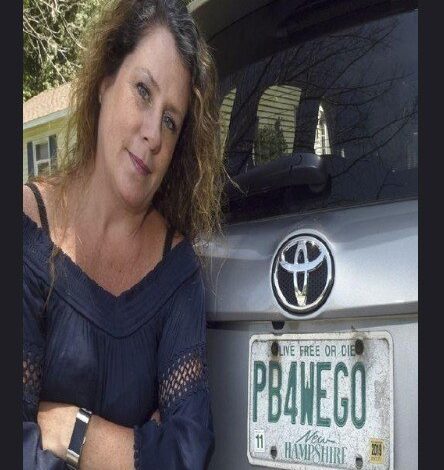
She has had her license plate for 15 years, but now the state finds it inappropriate
For most people, a license plate is just a string of random numbers and letters. But for those who choose custom vanity plates, it’s a chance to express a bit of personality, humor, or creativity on the open road. Over the years, some plates have sparked laughter, some have raised eyebrows, and others have landed their owners in disputes with state motor vehicle departments. Wendy Auger of Rochester, New Hampshire, knows that battle all too well.
For 15 years, Auger proudly drove around with her license plate reading “PB4WEGO.” It was a playful nod to a piece of advice parents everywhere have given their children: “Pee before we go.” For Auger, a bartender and mother, the plate wasn’t meant to be provocative or controversial—it was a clever reminder with a universal truth. Kids, after all, are notorious for asking for bathroom breaks moments after leaving the house.
But earlier this year, Auger received a letter that left her shocked. The New Hampshire Division of Motor Vehicles informed her that her longtime plate was being revoked. The reason? State officials now deemed the combination “inappropriate.”
“It’s just ridiculous,” Auger told reporters when the news broke. “It’s not a dirty word, it’s not offensive—it’s something every parent says to their kids. I’ve had this plate for 15 years, and nobody ever complained. Suddenly it’s a problem?”
The sudden rejection stems from a set of restrictions the state enforces on vanity plates. Years ago, the New Hampshire Supreme Court ruled that license plates are state-issued property, not a guaranteed free-speech platform. As a result, the DMV retains the right to deny or revoke plates that it believes contain offensive, indecent, or inappropriate language. The rules cover profanity, sexual references, and wording deemed to encourage violence or discrimination.
But Auger’s plate, she argues, fits none of those categories. “There’s nothing obscene about telling someone to use the bathroom before a trip. It’s common sense. It’s funny, but it’s not vulgar.”
What makes the decision even more baffling to Auger is how long she’s had the plate without any issue. She originally applied for it after the state increased the character limit for vanity plates, and she was thrilled when she saw it was available. Over the years, “PB4WEGO” became more than just a license plate—it became part of her identity. Friends laughed about it, strangers smiled at stoplights, and Wendy herself took pride in the clever wordplay.
Now, with the state demanding that she turn it in, she’s caught in a frustrating debate about where to draw the line between humor and offense, personal expression and government regulation.
Her story quickly spread online, sparking strong reactions from the public. Thousands of social media users weighed in, with many siding with Auger. “If that plate is inappropriate, then half the things people say in everyday life should be banned too,” one commenter wrote. Another added, “This is the kind of harmless humor we need more of, not less.”
Others, however, pointed out that the state is within its rights to enforce its policies, even if the reasoning seems inconsistent. “The DMV doesn’t have to let anyone say whatever they want on a plate,” one critic argued. “It’s government property, not a bumper sticker.”
Still, many feel Auger’s case highlights the arbitrary nature of these rulings. Across the country, vanity plates have been rejected for everything from mild puns to tongue-in-cheek jokes. What one official sees as harmless, another might flag as offensive. This inconsistency often leaves drivers confused and frustrated.
Auger herself insists the fight isn’t just about her plate—it’s about principle. “I shouldn’t have to give it up just because someone behind a desk suddenly decided they don’t like it. Where does it end? Do they take away plates with funny dog names next? What about ones that sound like inside jokes? At some point, we need to use common sense.”
For now, Auger faces a choice: comply with the DMV’s order and replace her beloved plate, or continue pushing back in hopes the state reconsiders. She admits daycare costs, bills, and everyday life take precedence, but she isn’t ruling out a formal appeal.
Her fight has struck a chord with people far beyond New Hampshire. To many, it’s a small but symbolic example of how bureaucracy can sometimes clash with everyday humor and human expression. At a time when headlines are dominated by serious political and social battles, this story—about a playful reminder to use the bathroom—reminds us that even the smallest freedoms can spark big debates.
Whether Wendy Auger ultimately keeps “PB4WEGO” or not, one thing is certain: her story has already made its mark. Parents everywhere know the phrase, kids everywhere roll their eyes at it, and now, drivers everywhere are thinking twice about how even the simplest joke can cause a stir.
As Auger puts it, “If we can’t laugh about telling kids to pee before a trip, then we’ve really lost our sense of humor.”




